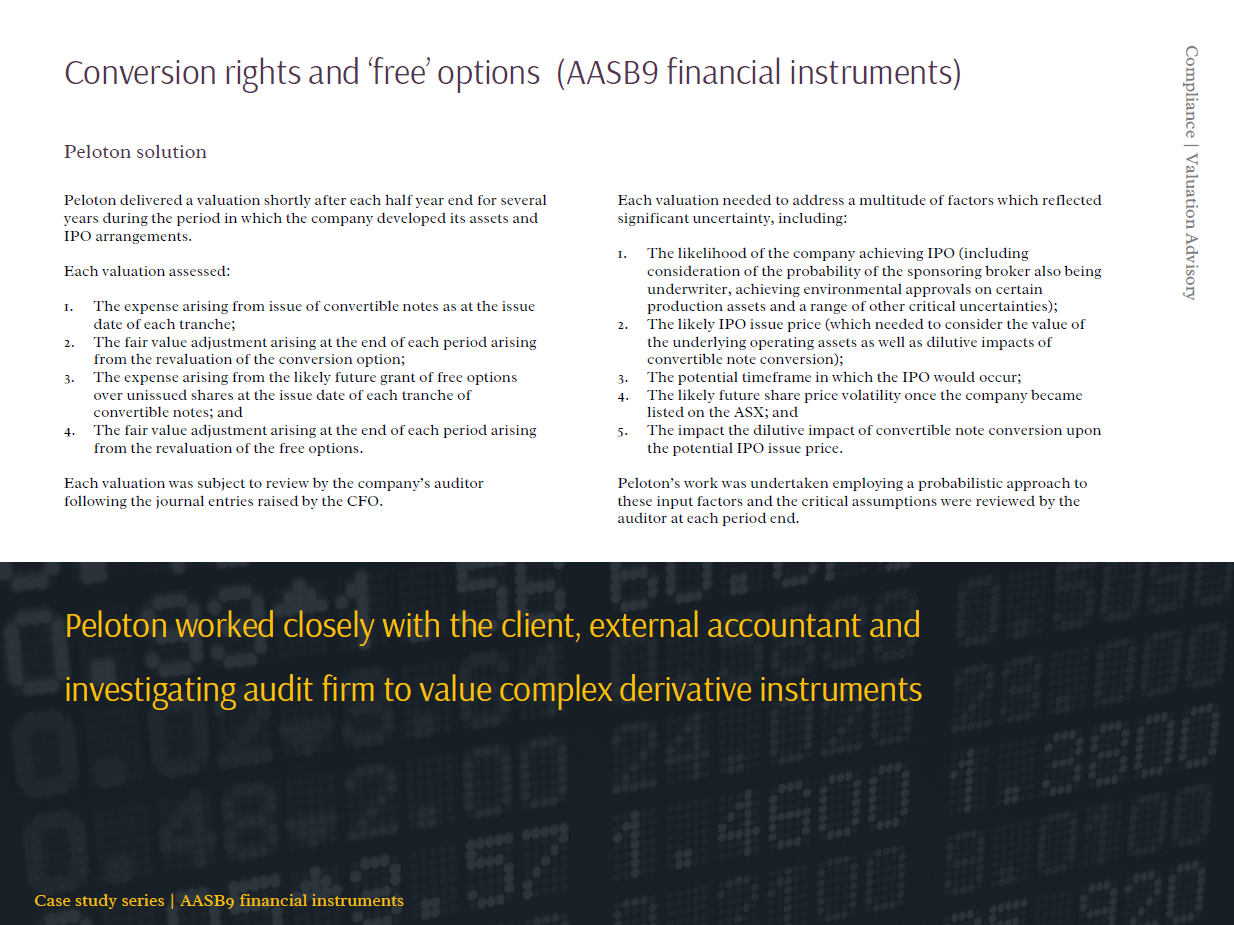The need for conversion rights and ‘free’ options
An unlisted mining and exploration company developed a capital structure characterised by vanilla (ordinary) equity and several tranches of convertible notes.
Over its development history, the company raised multiple tranches of convertible note funding every year as it pursued listing on the ASX.
Each tranche of convertible notes had a common characteristic, the right to convert to equity immediately prior to the ASX listing and the right to free attaching options over unissued shares upon conversion from debt to equity.
As an unlisted public company, compliance with AASB9 Financial Instruments was required.
AASB9 required that the embedded option in each note (i.e. the right to convert from debt to equity) be valued and treated as a cost of borrowing.
AASB9 also required that any movement in the value of the conversion option be marked to market ad treated as a fair value expense each half-year.
In addition, as the note holders were entitled to free attaching options on conversion to equity, the value of those options also needed to be treated as part of the cost of finance on issue of the notes and a fair value adjustment made every half-year.
Valuation issues and considerations
At each issue date and each period-end a valuation would be required of:
- The right (option) to convert to equity; and
- The free options granted on conversion.
As the right to convert was dependent upon the likelihood of an IPO occurring, the probability that the company would achieve that outcome and the timeframe in which it might occur needed to be assessed.
The value of the conversion option would be a function of the likely IPO issue price and the benefit (if any) to note holders converting their debt instrument (inclusive of accumulated interest and net of a discounted conversion price to the IPO price)
The value of the free options would also need to be assessed taking into account the time to conversion (i.e. the grant of the options) and standard option valuation criteria (i.e. assessing intrinsic value, time value and volatility value).
In addition, exercise of the options over unissued shares needed to recognise that the options were “Bermudan” i.e. capable of exercise during specified windows through the life of the options.
As an unlisted company, the volatility value would need to give consideration of the likely underlying share price volatility notwithstanding there would be no evidence of share price volatility at the valuation dates.
Two valuations would be required for each reporting period:
- On issue of each tranche of convertible notes (to assess the implied expense); and
- At period-end (to assess the fair value adjustment).
Each tranche of convertible notes were issued with different interest rates and some had a forced conversion on IPO (whilst others provided the note holder with the choice of conversion at IPO).
The free options also varied across the tranches of convertible notes as to exercise price and term.
Over the period in which the convertible notes were issued, over 40 valuations would be required to the eventual IPO date in order to comply with AASB9.
Peloton solution
Peloton delivered a valuation shortly after each half year end for several years during the period in which the company developed its assets and IPO arrangements.
Peloton worked closely with the client, external accountant and investigating audit firm to value complex derivative instruments
Each valuation assessed:
- The expense arising from issue of convertible notes as at the issue date of each tranche;
- The fair value adjustment arising at the end of each period arising from the revaluation of the conversion option;
- The expense arising from the likely future grant of free options over unissued shares at the issue date of each tranche of convertible notes; and
- The fair value adjustment arising at the end of each period arising from the revaluation of the free options.
Each valuation was subject to review by the company’s auditor following the journal entries raised by the CFO.
Each valuation needed to address a multitude of factors which reflected significant uncertainty, including:
- The likelihood of the company achieving IPO (including consideration of the probability of the sponsoring broker also being underwriter, achieving environmental approvals on certain production assets and a range of other critical uncertainties);
- The likely IPO issue price (which needed to consider the value of the underlying operating assets as well as dilutive impacts of convertible note conversion);
- The potential timeframe in which the IPO would occur;
- The likely future share price volatility once the company became listed on the ASX; and
- The impact the dilutive impact of convertible note conversion upon the potential IPO issue price.
Peloton’s work was undertaken employing a probabilistic approach to these input factors and the critical assumptions were reviewed by the auditor at each period end.
Engagement outcomes
Over a four-year period, the valuations resulted in significant expense through the P&L.
This expense varied materially between periods as the company’s prospects of IPO varied due to a variety of factors including the stage of development of the company’s mining assets and exploration targets, a change in IPO sponsoring broker, interest rates and the terms of the various tranches of convertible notes.
At each reporting date, the company auditor was satisfied that the approach adopted by Peloton to the assessment of the embedded derivatives and ‘free’ options was appropriate and no accounting adjustments were necessitated.
Peloton has been engaged to undertake AASB2 Share Based Payment valuations in relation to the employee share scheme now that the company has successfully completed its IPO.
Peloton has been engaged to undertake AASB2 Share Based Payment valuations in relation to the employee share scheme now that the company has successfully completed its IPO.
